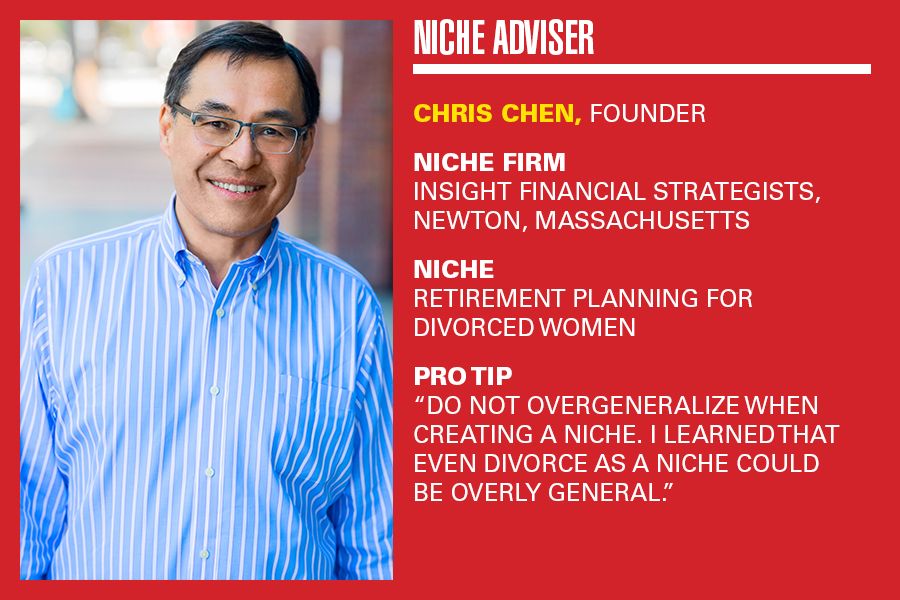How one adviser came to specialize in serving divorced women

Chris Chen, who began developing his niche 12 years ago, said advisers should identify niches that are as specific as possible.
Chris Chen says the idea of focusing his financial planning business on women going through a divorce came down to recognizing a need and looking for solutions to problems commonly facing this particular niche.
“You want a population that has a set of problems that are homogeneous and then have the technical information to address it,” he said. “Once you have that, you have a niche.”
Chen, founder of Insight Financial Strategists in Newton, Massachusetts, started developing his niche in financial planning 12 years ago while he was working for a broker-dealer that frowned on his trying to concentrate on such a narrow slice of potential clients.
“One of the reasons for launching my own business nine years ago is the broker-dealer was less enthused about the niche,” Chen said.
‘NICHE IS A NECESSITY’
As research continues to support niche planning over the more common generalist model, financial advisers like Chen are emerging as examples of how and why the wealth management business is evolving into a universe of specialists.
“Niche is a necessity because the future of the advice business is a niche business,” said Michael Kitces, head of planning strategy at Buckingham Strategic Partners. “Look at virtually any profession and you’ll see that the generalists struggle, while the specialists are the ones with the most successful businesses.”

A new report from Inside Information and Dialektic Consulting, entitled “New Frontiers in Wealth Management,” highlights niche planning as one of four main drivers pushing the wealth management industry to its next level of success.
Chen, who recognized some of the challenges unique to people going through a divorce, didn’t set out to focus on women. But once he started focusing on divorce, all the people coming to him for help were women, he said.
“I guess it goes back to the idea that men will never stop to ask for directions,” he said. “It seems men also won’t ask for help when they’re going through a divorce.”
PLANNING POST-DIVORCE
The fact that Chen’s niche evolved to focus primarily on women supports his advice to other planners looking for a group of clients to target.
“Do not overgeneralize when creating a niche,” he said. “I learned that even divorce as a niche could be overly general.”
Chen recommends identifying a niche and then proceed to narrow it down as much as possible.
“My niche is now not just women going through a divorce, but essentially retirement planning for women after divorce,” he said.
As Chen sees it, potential niches are everywhere you look and the more specialized, the better the service the adviser will be able to provide.
“What makes it a good niche is that the problems encountered, such as retirement asset division, Social Security, alimony and child support, and so on, are unique to the population,” he said. “As a result, they are not addressed effectively as a whole by mainline financial planners. Specialization allows me to be a better fiduciary, and for the client to get much-needed advice that they would not otherwise be able to get.”
A key element in developing a strong niche, Chen added, is drawing hard lines for when the business starts drifting beyond the specialized focus. “If something is outside of my expertise and experience, I will not address it.”
Specializing also comes with business development and marketing challenges and opportunities, Chen said. “It allows you to narrow your focus and makes a lot of things clearer.”
For marketing, Chen has connected with centers of influence among mediators and divorce lawyers. He also serves on the board of the Massachusetts Council on Family Mediation, and he recently started a podcast called Friday Divorce.
Because his clients are often in a state of financial uncertainty when he first meets them, Chen has found that hourly fees work best for his niche.
“Divorce is uniquely suited to hourly fees because when people have a problem, they just need it fixed,” he said. “Niches come with specific sets of problems that when you’re a generalist you don’t come across all the time, and there will be some issues that don’t exist elsewhere.”
To read more articles in this series, click here
Learn more about reprints and licensing for this article.








